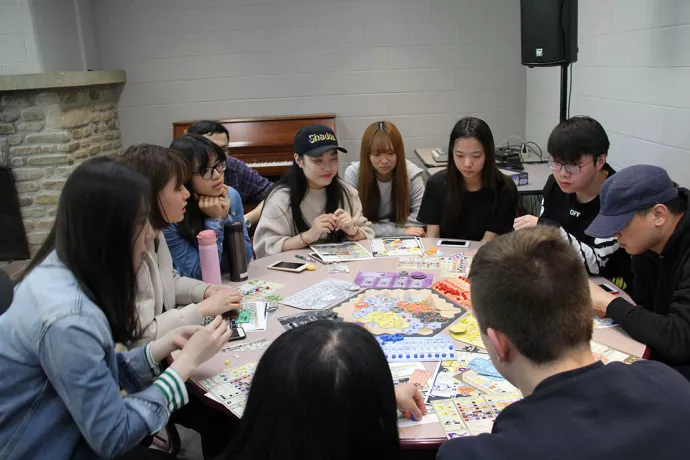
Gaming in the classroom: UTM’s academic skills centre embraces board games to enhance learning
If you’re falling asleep in lectures, then gaming might help you learn the subject better.
Robert Gillespie Academic Skills Centre’s Program Manager and Learning Strategist Thomas Klubi advocates game-learning in the classroom and beyond. He believes board games, card games, role-playing games, and other tactile, interactive and social games are beneficial to social development and information processing.
An avid gamer with a massive personal board game collection, Klubi brings students together at the Board Game Cafés, an initiative through the centre’s Game-Enhanced Learning program. Klubi runs the café with assistance from peer mentors Christian de Castro, Christopher de Castro, Jennifer Xu, Matthew Rappaport, Mitchel Pedicelli, and Nai Sibai.
In the previous academic year, 11 game cafés at the CCIT Atrium saw a total attendance of 980 students. A survey of attendees revealed the cafés helped increase confidence, improved social skills, encouraged participation in campus events and helped students relax.
Unable to host in-person café’s due to the pandemic, peer mentors are now active in virtual communities with students.
Klubi says that gaming creates an immersive environment where students collaborate to process information and attach it to core concepts.
“We find that students learn better when there’s a game type of atmosphere involved, the game experience is a memory they can relate to,” Klubi explains. “The idea is they use it as a mechanism for acquiring information that would be normally delivered through a lecture.”
There’s a mountain of academic research on the introduction of “gamification” into the curriculum, he continues. In one example he cites a professor from Virginia’s Marine Corps War College who used the board game Polis to teach the history of the Peloponnesian War.
“It was a very good exploration of the economics, demographics, and politics shaping the war,” Klubi says. “It’s a non-linear, interactive, tactile way of acquiring a working knowledge of a topic. It allows you to process and create meaning.”
In 2017, Klubi worked with associate professor of economics Lee Bailey to use board games to help students understand macroeconomics.
“This is becoming the norm for instructors,” he said. “We’re not necessarily in a text-based society anymore. Experience anchors theory.”
In addition to being involved in a number of groups on campus, peer mentors are also connected to a number of Communication, Culture, Information & Technology (CCIT) courses that already offer a type of “game-learning” environment.
One course, User Experience Design - UXD and Board Games, gives students the chance to explore user experience, game theory, and board game mechanics to create a board game.
“It’s a very popular course,” Klubi says. “It also shows you the potential for board games in a pedagogical context.”
Games can be used to support accessibility, he adds. It also offers a “very social atmosphere,” allowing students of different backgrounds to come together, and “feel like a part of the campus.”
The café’s peer mentors have supported courses with games as well. In a recent fourth year course mentors gave students a set of games including an escape room game and a Dungeons & Dragons campaign.
“This type of game environment worked perfectly for senior students,” Klubi says. “You develop a respect for your colleagues, learn to problem solve, and you can take that experience back to the lab and get a better sense of working together as a team.”
Read more:
